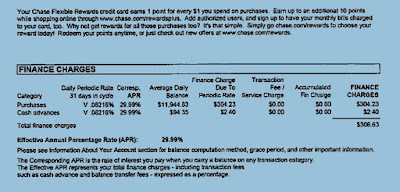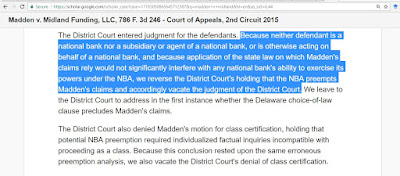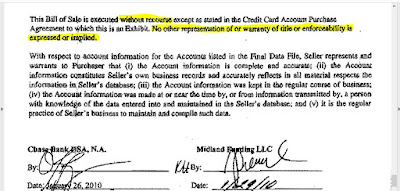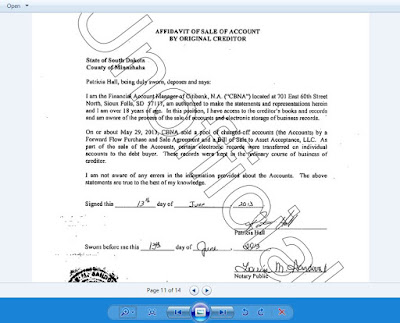This is not a consumer credit case, but it is nevertheless interesting in that it illuminates the Texas usury statute, which provides for usury liability to be triggered by contracting for usurious interest also, in addition to charging and receiving it. Because of the use of disjunctive ("or") in the relevant section of the Texas Finance Code, the party asserting the usury claim against the creditor need not show that he actually paid any of the contracted-for usurious interest to be entitled to relief under the usury statute, and the available relief under that statute also includes attorney's fees.
 |
| Leteff v. Roberts (Tex.App. - Houston 2018) |
JOE LETEFF, Appellant,
v.
JIMMY ROBERTS, INDIVIDUALLY AND D/B/A CITY AUTO SALES, Appellee.
Court of Appeals of Texas, First District, Houston.
Paul Houston Lavalle, for Jimmy Roberts, Individually and d/b/a City Auto Sales, Individually and d/b/a City Auto Sales, Appellee.
Daniel Kistler, for Joe Leteff, Appellant.
On Appeal from the 212th District Court, Galveston County, Texas, Trial Court Case No. 16-CV-0645.
Panel consists of Justices Bland, Lloyd, and Caughey.
OPINION
RUSSELL LLOYD, Justice.
A creditor made numerous cash loans to an obligor for the obligor's business. The obligor failed to repay many of the loans, and the creditor sued. After a bench trial, the trial court found the obligor liable in contract and the creditor liable for usury. The court awarded the obligor an offset equal to the usury damages he was owed on the four loans that he repaid but refused to award any usury damages on the 10 loans that he failed to repay. In part because of this, the obligor's contract liability exceeded the creditor's usury liability. The parties agreed to a reduced judgment of $1,094,047.04 in the creditor's favor, but the court noted that the obligor did not waive his right to appeal.
The obligor appeals the trial court's refusal to award him usury damages on the 10 loans that he failed to repay. He also appeals the court's refusal to award him attorneys' fees under the usury statutes. We reverse and remand.
Background
Joe Leteff met Jimmy Roberts through a mutual acquaintance. Leteff told the acquaintance that he was looking for financing for his business—providing manpower and equipment rentals to the oil-and-gas industry. The acquaintance called Roberts, who provided financing for the acquaintance's used-car dealership.
Leteff and Roberts, with Roberts's attorney present, met at the dealership to discuss a deal. Leteff proposed, and the parties reduced to writing, a transaction that specified that Roberts would "loan" Leteff $40,000 and that Leteff would repay in 45 days both the $40,000 and $20,000 as an "interest amount." Leteff and Roberts signed the agreement. The acquaintance looked on as Leteff and Roberts "did the transaction" at the dealership's table.
Leteff and Roberts entered into more similarly structured loans, some reduced to writing and others not. In all, Leteff and Roberts entered into 17 loans, each with a stated principal amount and an obligation that Leteff repay the principal. Fourteen of the loans called for a stated interest amount; the other three did not call for any interest. On at least one occasion, Leteff met Roberts and the acquaintance at Roberts's house for a loan of over half a million dollars. That amount was counted out in cash, and Leteff took the cash away in grocery bags.
Of the 14 loans that called for interest, Leteff repaid Roberts on only four. Leteff never repaid Roberts on the remaining 10 loans.
Roberts sued Leteff for breach of contract. Leteff counterclaimed for usury, under Texas Finance Code § 305.001, on the 14 loans that called for interest. The parties tried the case without a jury, and the trial court entered a judgment in Roberts's favor for $1,094,047.04.
The trial court, on request, entered findings of fact and conclusions of law. For each of the 17 loans, the trial court listed the date; principal amount; interest amount, if any; and period for repayment, if any was specified. The court also noted which loans were memorialized in a written agreement. For loans in which the parties failed to specify a period for repayment, the court applied a default period of one year.
The trial court entered a conclusion of law that it "will not award any interest in transactions to Leteff where Leteff fully defaulted on the repayment of" principal and interest. The court then applied Finance Code § 305.001(a-1), found that Roberts was liable for usury, and awarded Leteff an offset against the money he had not repaid for the usury damages on the four loans that he had repaid. The trial court did not award any usury damages or offset for the 10 loans not repaid.
The trial court's findings of fact establish the following about the 10 loans:
1. The March 13, 2014 loan, by written agreement, provided for $100,000 in principal, $40,000 in interest, and repayment in 60 days.
2. The April 9, 2014 loan provided for $60,000 in principal and $40,000 in interest.
3. The May 9, 2014 loan, by written agreement, provided for $52,750 in principal, $10,000 in interest, and repayment in seven days.
4. The July 10, 2014 loan, by written agreement, provided for $60,000 in principal, $10,000 in interest, and repayment in seven days.
5. The July 18, 2014 loan, by written agreement, provided for $553,720 in principal and $425,000 in interest.
6. The July 23, 2014 loan, by written agreement, provided for $285,000 in principal, $90,000 in interest, and repayment in 60 days.
7. The July 26, 2014 loan provided for $100,000 in principal and $75,000 in interest.
8. The August 12, 2014 loan provided for $35,000 in principal and $8,000 in interest.
9. The April 21, 2015 loan provided for $200,000 in principal and $80,000 in interest.[1]
10. One of the two August 14, 2015 loans—the only one in which the parties contracted for interest—provided for $50,000 in principal and $30,000 in interest.
The trial court then computed its judgment. It noted that the amount it computed for Roberts's contract damages for the money not repaid, after applying the usury offset, "was reduced by agreement of the parties to $1,094,047.04." Despite this agreement, Leteff "did not waive his right to appeal" the judgment.
The trial court also noted that the parties stipulated that reasonable attorneys' fees for either party were $19,000.00 and that litigation costs other than taxable costs were $1,000.00. However, the trial court refused to award attorneys' fees to either party.
Leteff appealed. In his appeal, he challenges only two of the trial court's conclusions—(1) that he should not be awarded usury damages for any of the 10 loans that he did not repay and (2) that he should not be awarded attorneys' fees or costs. He does not challenge any of the trial court's other findings of fact or conclusions of law.
Roberts responded. His response brief does not raise any cross-points or challenge any finding of fact or conclusion of law. He prays only that the trial court's judgment be affirmed.
Usury Damages for Loans that Leteff Did Not Repay
A. Standard of Review and Applicable Law
In an appeal from a bench trial, the trial court's findings of fact carry the same weight as a jury verdict. Nguyen v. Yovan, 317 S.W.3d 261, 269-70 (Tex. App.-Houston [1st Dist.] 2009, pet. denied). "We defer to unchallenged findings of fact that are supported by some evidence." Tenaska Energy, Inc. v. Ponderosa Pine Energy, LLC, 437 S.W.3d 518, 523 (Tex. 2014). Unchallenged findings of fact do not bind us when "the contrary is established as a matter of law, or if there is no evidence to support the finding." Meehl v. Wise, 285 S.W.3d 561, 565 (Tex. App.-Houston [14th Dist.] 2009, no pet.).
A trial court has no discretion in determining the law or applying it to the facts. Tenaska Energy, 437 S.W.3d at 523. So we review questions of law de novo. See BSG-Spencer Highway Joint Venture, G.P. v. Muniba Enters., Inc., No. 01-15-01109-CV, 2017 WL 3261365, at *5 (Tex. App.-Houston [1st Dist.] Aug. 1, 2017, no pet.) (mem. op.); Nipp v. Broumley, 285 S.W.3d 552, 555-56 (Tex. App.-Waco 2009, no pet.).
A creditor who contracts with an obligor for interest that is greater than the maximum interest allowable by law is liable to the obligor for usury. See TEX. FIN. CODE ANN. § 305.001(a-1) (West 2016). The creditor then owes the obligor a statutory penalty, which is computed by subtracting the amount of maximum allowable interest from the amount of interest actually contracted for and then trebling that result. See id.
Interest need not be expressed as a rate or percentage to be considered usurious. If the creditor agrees to "any compensation that constitutes interest, the obligor is considered to have agreed on the rate produced by the amount of that interest, regardless of whether that rate is stated in the agreement." Id. § 302.002. "`Interest' means compensation for the use, forbearance, or detention of money." Id. § 301.002(a)(4). "`Usurious interest' means interest that exceeds the applicable maximum amount allowed by law." Id. § 301.002(a)(17).
A default maximum allowable interest rate of 10 percent per annum generally applies unless a statutory optional rate ceiling applies. See id. §§ 302.001(b), 303.001-.009. If an optional rate ceiling applies but is less than 18 percent per annum, then the maximum allowable interest rate is 18 percent per annum. Id. § 303.009(a).
B. Roberts is liable for usury on all loans in which he contracted for usurious interest.
1. The unambiguous text of Finance Code § 305.001(a-1) requires that Roberts be held liable.
Leteff contends that the trial court erred by refusing to award usury damages on loans that he did not repay even though the parties had contracted for usurious interest on those loans.
The unambiguous text of Finance Code § 305.001(a-1) provides that a creditor is liable for usury when the creditor merely contracts for usurious interest on a loan and notwithstanding the obligor's failure to repay that loan.
The statute says:
A creditor who contracts for or receives interest that is greater than the amount authorized by this subtitle in connection with a commercial transaction is liable to the obligor for an amount that is equal to three times the amount computed by subtracting the amount of interest allowed by law from the total amount of interest contracted for or received.
Id. § 305.001(a-1) (emphasis added).
The key is the disjunctive "or." Either of the two acts connected by the "or"—(1) contracting for usurious interest or (2) receiving usurious interest—by itself is sufficient to trigger liability. Rahmani v. Banet, No. 02-14-00240-CV, 2015 WL 2169765, at *2 (Tex. App.-Fort Worth July 9, 2015, pet. denied) (mem. op.) (quoting Smart v. Tower Land & Inv. Co., 597 S.W.2d 333, 340 (Tex. 1980)); accord Sturm v. Muens, 224 S.W.3d 758, 764 & n.11 (Tex. App.-Houston [14th Dist.] 2007, no pet.) (construing similarly disjunctive Finance Code § 305.001(a) and reasoning that "it is not necessary that a demand be made for the payment of usurious interest because merely contracting for it is a violation of the usury statutes"). Even if Roberts did not receive any usurious interest on the loans that Leteff did not repay, the statute requires that Roberts be held liable because he contracted for usurious interest.
The Supreme Court of Texas interpreted a previous version of the relevant Finance Code language (and the same use of the disjunctive in its Revised Civil Statutes predecessor)[2] in similar fashion to the Rahmani court's interpretation of current subsection (a-1)'s use of the disjunctive: any one of the acts connected by the "or," on its own, is sufficient to trigger liability. See Danziger v. San Jacinto Sav. Ass'n, 732 S.W.2d 300, 304 (Tex. 1987); Smart, 597 S.W.2d at 340; Windhorst v. Adcock Pipe & Supply,547 S.W.2d 260, 261 (Tex. 1977) (per curiam) ("By describing the conditions precedent to recovery of penalties in the disjunctive, the Legislature made it clear that only one such condition need occur to trigger penalties; either a contract for, a charge of or receipt of usurious interest.").
The law awards an obligor usury damages as "a boon or a windfall which he is allowed to receive as a punishment to the usurious lender. . . . A successful claim of usury may allow the borrower to avoid a debt he might otherwise owe." Steves Sash & Door Co. v. Ceco Corp., 751 S.W.2d 473, 476-77 (Tex. 1988). The usury law therefore punishes Roberts for contracting for usurious loans, even if the result is a windfall for Leteff.
2. Roberts's counterarguments are unavailing.
Roberts responds with four contentions. First, he contends that the 17 transactions were investments and were not loans. Generally, investments are not subject to usury law because the law applies to transactions in which the obligor has an absolute obligation to repay the principal. See Anglo-Dutch Petrol. Int'l, Inc. v. Haskell, 193 S.W.3d 87, 96-97 (Tex. App.-Houston [1st Dist.] 2006, pet. denied); Bray v. McNeely, 682 S.W.2d 615, 619-20 (Tex. App.-Houston [1st Dist.] 1984, no writ). However, this does not benefit Roberts because the trial court entered findings of fact and conclusions of law that each of the 17 transactions was a loan. Roberts has not raised any challenge to the factual or legal sufficiency of the trial court's findings or conclusions. "We defer to unchallenged findings of fact that are supported by some evidence." Tenaska Energy, 437 S.W.3d at 523. Further, there is some evidence to support the trial court's findings and conclusions—the parties' written agreements' language that the principal amounts "will be paid back," the agreements' use of the word "loan," and Roberts's use of the word "loan" to describe the parties' written and unwritten transactions in his trial testimony. We therefore defer to the trial court's unchallenged findings and conclusions.
Second, Roberts contends that he should not be liable for usurious contract terms that Leteff suggested be included in the loan agreements. But "the test for alleged usury is not concerned with which party might have originated the usurious provisions." First State Bank of Bedford v. Miller, 563 S.W.2d 572, 575 (Tex. 1978); accord Sturm, 224 S.W.3d at 764 n.11; Dunnam v. Burns, 901 S.W.2d 628, 631-32 (Tex. App.-El Paso 1995, no writ). This principle extends to the parties' unwritten loan agreements. See Dunnam, 901 S.W.2d at 631-32 & n.2 (applying principle to contract that creditor had not signed).
Third, Roberts suggests that Leteff erroneously seeks the application of Finance Code § 305.001(a), which concerns only transactions that are "for personal, family, or household use." To the contrary, Leteff has argued, in this court and in the trial court, for the application of Finance Code § 305.001(a-1), which specifically addresses commercial transactions.
Fourth, Roberts contends that equitable doctrines like unclean hands or unjust enrichment should bar the usury recovery that Leteff seeks. Leteff's action for usury is not subject to these equitable doctrines. See Greever v. Persky, 156 S.W.2d 566, 569 (Tex. Civ. App.-Fort Worth 1941) (holding unclean-hands defense inapplicable to usury action because action was not equitable proceeding), aff'd, 165 S.W.2d 709 (Tex. 1942); see also Furr v. Hall, 553 S.W.2d 666, 672 (Tex. Civ. App.-Amarillo 1977, writ ref'd n.r.e.) (citing Greever for proposition that unclean hands "is strictly an equitable doctrine not applicable outside equitable proceedings").
3. We remand for further proceedings.
Ordinarily when reversing a trial court's judgment after a bench trial solely on a question of law, we are to render the judgment that the trial court should have rendered. See TEX. R. APP. P. 43.3; Tex. Utils. Elec. Co. v. City of Waco, 919 S.W.2d 436, 440 (Tex. App.-Waco 1995, writ denied). However, a remand is sometimes necessary for further proceedings or when the interests of justice require. TEX. R. APP. P. 43.3(a), (b). We remand when "there is a probability that a case has for any reason not been fully developed. . . ." Bayway Servs., Inc. v. Ameri-Build Constr., L.C., 106 S.W.3d 156, 161 (Tex. App.-Houston [1st Dist.] 2003, no pet.). Or when there may be "outstanding issues in light of this court's opinion." Elbar Invs., Inc. v. Garden Oaks Maint. Org., 500 S.W.3d 1, 5 (Tex. App.-Houston [1st Dist.] 2016, pet. denied).
We remand this case to the trial court because two issues appear not to be fully developed in the record before us. See Elbar Invs., 500 S.W.3d at 5; Bayway Servs.,106 S.W.3d at 161.
First, the trial court should calculate the usury damages Leteff is entitled to for the 10 loans that are the subject of this appeal. See, e.g., Strasburger Enters., Inc. v. TDGT Ltd. P'ship, 110 S.W.3d 566, 579-80 (Tex. App.-Austin 2003, no pet.) (remanding for new calculation of usury award); Perez v. Hernandez, 658 S.W.2d 697, 702 (Tex. App.-Corpus Christi 1983, no writ) (remanding for calculation of attorneys' fees owed on successful usury claim).
Second, the trial court's findings of fact and conclusions of law refer to an agreement between the parties that reduced the judgment in Roberts's favor, even after applying Leteff's usury offset, to $1,094,047.04. None of the terms of this agreement are before us. We cannot determine if or how the parties' agreement would affect the outcome in the trial court once the court enters judgment in accordance with this opinion.
Attorneys' Fees
Leteff also contends that the trial court erred by refusing to award him attorneys' fees and costs under Finance Code § 305.005. "A creditor who is liable under Section 305.001 or 305.003 is also liable to the obligor for reasonable attorney's fees set by the court." TEX. FIN. CODE ANN. § 305.005 (West 2016). The availability of attorneys' fees under a statute is a question of law. Holland v. Wal-Mart Stores, Inc., 1 S.W.3d 91, 94 (Tex. 1999) (per curiam).
The trial court entered a conclusion of law that "No attorney fees were awarded." Leteff and Roberts "stipulated that reasonable attorney's fees for each party are $19,000.00, and costs of litigation, other than taxable costs, are $1,000.00.. . ." Therefore, if Leteff should be awarded both reasonable attorneys' fees and costs under Finance Code § 305.005, he would be owed $20,000.00.
Under the statute's plain language, the only requirement for awarding an obligor reasonable attorneys' fees is that the creditor be found liable for usury under Finance Code § 305.001 or § 305.003. See Robinson & Harrison Poultry Co. v. Galvan, 323 S.W.3d 236, 247 (Tex. App.-Corpus Christi 2010, pet. granted, judgm't vacated w.r.m.). The trial court found Roberts liable for usury under Finance Code § 305.001. Therefore, the trial court should have awarded Leteff the $19,000.00 that the parties stipulated to for attorneys' fees.
Costs are different. Generally, attorneys' fees and costs are mutually exclusive. See In re Nalle Plastics Family Ltd. P'ship, 406 S.W.3d 168, 175 (Tex. 2013) (orig. proceeding). For example, Civil Practice and Remedies Code chapter 38 "differentiates between attorney's fees and costs." Id. (citing TEX. CIV. PRAC. & REM. CODE § 38.001). The Legislature has chosen to make costs recoverable elsewhere, but not in Finance Code § 305.005. Compare TEX. FIN. CODE ANN. § 396.351(b) (West 2016) (expressly making both "costs" and "attorney's fees" recoverable to certain parties), TEX. CIV. PRAC. & REM. CODE ANN. § 27.009(a)(1) (West 2015) (same), and TEX. CIV. PRAC. & REM. CODE ANN. § 38.001 (West 2015) (same), with TEX. FIN. CODE ANN. § 305.005 (West 2016) (omitting "costs"). The Legislature omitted "costs" from Finance Code § 305.005, and we presume that it was "excluded for a purpose." See Cameron v. Terrell & Garrett, Inc., 618 S.W.2d 535, 540 (Tex. 1981). We therefore hold that the trial court did not err by refusing to award the stipulated $1,000.
Conclusion
We reverse the judgment of the trial court insofar as it (i) failed to award Leteff damages for the 10 usurious loans that he did not repay and (ii) failed to award Leteff $19,000.00 for attorneys' fees. We remand the case for further proceedings consistent with this opinion.
[1] The trial court's findings of fact and conclusions of law say of this loan that "Roberts loaned Leteff $280,000.00. . . ." To the extent the court found that the principal for this loan was $280,000 and not $200,000, we do not defer to this finding because it is not supported by any evidence and because the evidence establishes as a matter of law a contrary principal amount. See Tenaska Energy, Inc. v. Ponderosa Pine Energy, LLC, 437 S.W.3d 518, 523 (Tex. 2014); Meehl v. Wise, 285 S.W.3d 561, 565 (Tex. App.-Houston [14th Dist.] 2009, no pet.). Both Roberts and Leteff testified about this unwritten loan's terms, and their testimony establishes that the loan's principal amount was only $200,000 and that Leteff was to repay $280,000 on the loan.
[2] See Act of May 26, 1997, 75th Leg., R.S., ch. 1008, §§ 1, 6, 7, sec. 305.001, 1997 Tex. Gen. Laws 3091, 3437, 3602, 3603 (amended 1999, 2005) (current version at TEX. FIN. CODE § 305.001(a), (a-1)) (codifying at then-Finance Code § 305.001(a) a nonsubstantive revision of former Revised Civil Statutes article 5069-1.06).




























